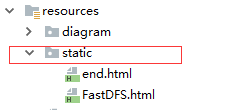FastDFS通过java上传文件到linux服务器,通过nginx进行查看
#一、FastDFS简介及系统环境搭建:点击进入
#二、FastDFS 配置 Nginx 模块及访问测试:点击进入
首先确保tracker 和 storage 启动
启动tracker服务:
/usr/bin/fdfs_trackerd /etc/fdfs/tracker.conf start
启动storage服务:
/usr/bin/fdfs_storaged /etc/fdfs/storage.conf start
查看监听:
netstat -lnpt|grep fdfs
1.导入需要的坐标
<dependency>
<groupId>org.springframework.boot</groupId>
<artifactId>spring-boot-starter-web</artifactId>
</dependency>
<dependency>
<groupId>cn.hutool</groupId>
<artifactId>hutool-all</artifactId>
<version>4.0.12</version>
</dependency>
<dependency>
<groupId>org.csource</groupId>
<artifactId>fastdfs-client-java</artifactId>
<version>1.27-SNAPSHOT</version>
</dependency>
如果 fastdfs-client-java 无法导入,需要安装源码到maven仓库,点击此处
2.启动类设置
@SpringBootApplication
public class FileUploadWebApplication {
public static void main(String[] args) throws Exception {
SpringApplication.run(FileUploadWebApplication.class, args);
}
@Bean
public TomcatServletWebServerFactory tomcatEmbedded() {
TomcatServletWebServerFactory tomcat = new TomcatServletWebServerFactory();
tomcat.addConnectorCustomizers((TomcatConnectorCustomizer) connector -> {
if ((connector.getProtocolHandler() instanceof AbstractHttp11Protocol<?>)) {
//-1 means unlimited
((AbstractHttp11Protocol<?>) connector.getProtocolHandler()).setMaxSwallowSize(-1);
}
});
return tomcat;
}
tomcatEmbedded 这段代码是为了解决,上传文件大于10M出现连接重置的问题。此异常内容 GlobalException 也捕获不到。

3.前端页面
xmlns:th="http://www.thymeleaf.org">
Spring Boot file upload example
展示结果页面
Spring Boot - Upload Status
{message}">
{
message}"/>
4.创建FastDFS工具类
public class FastDFSFile {
private String name;
private byte[] content;
private String ext;
private String md5;
private String author;
//省略getter、setter
创建fdfs_client.conf文件,进行配置
connect_timeout = 60
network_timeout = 60
charset = UTF-8
http.tracker_http_port = 8070
http.anti_steal_token = no
http.secret_key = 123456
tracker_server = 192.168.206.101:22122 ##换上linux上tracker的ip
package com.activity.FastDFS;
import cn.hutool.core.io.resource.ClassPathResource;
import org.csource.common.NameValuePair;
import org.csource.fastdfs.*;
import org.slf4j.LoggerFactory;
import java.io.ByteArrayInputStream;
import java.io.IOException;
import java.io.InputStream;
public class FastDFSClient {
private static org.slf4j.Logger logger = LoggerFactory.getLogger(FastDFSClient.class);
/**
* 封装 FastDFSClient 类,包含常用的上传、下载、删除等方法。
* 首先在类加载的时候读取相应的配置信息,并进行初始化。
*/
static {
try {
String filePath = new ClassPathResource("fdfs_client.conf").getFile().getAbsolutePath();;
ClientGlobal.init(filePath);
} catch (Exception e) {
logger.error("FastDFS Client Init Fail!",e);
}
}
/**
* 文件上传
* @param file
* @return
*/
public static String[] upload(FastDFSFile file) {
logger.info("File Name: " + file.getName() + "File Length:" + file.getContent().length);
NameValuePair[] meta_list = new NameValuePair[1];
meta_list[0] = new NameValuePair("author", file.getAuthor());
long startTime = System.currentTimeMillis();
String[] uploadResults = null;
StorageClient storageClient=null;
try {
storageClient = getTrackerClient();
uploadResults = storageClient.upload_file(file.getContent(), file.getExt(), meta_list);
} catch (IOException e) {
logger.error("IO Exception when uploadind the file:" + file.getName(), e);
} catch (Exception e) {
logger.error("Non IO Exception when uploadind the file:" + file.getName(), e);
}
logger.info("upload_file time used:" + (System.currentTimeMillis() - startTime) + " ms");
if (uploadResults == null && storageClient!=null) {
logger.error("upload file fail, error code:" + storageClient.getErrorCode());
}
String groupName = uploadResults[0];
String remoteFileName = uploadResults[1];
logger.info("upload file successfully!!!" + "group_name:" + groupName + ", remoteFileName:" + " " + remoteFileName);
return uploadResults;
}
/**
* 使用 FastDFS 提供的客户端 storageClient 来进行文件上传,最后将上传结果返回。
* 根据 groupName 和文件名获取文件信息。
* @param groupName
* @param remoteFileName
* @return
*/
public static FileInfo getFile(String groupName, String remoteFileName) {
try {
StorageClient storageClient = getTrackerClient();
return storageClient.get_file_info(groupName, remoteFileName);
} catch (IOException e) {
logger.error("IO Exception: Get File from Fast DFS failed", e);
} catch (Exception e) {
logger.error("Non IO Exception: Get File from Fast DFS failed", e);
}
return null;
}
/**
* 下载文件
* @param groupName
* @param remoteFileName
* @return
*/
public static InputStream downFile(String groupName, String remoteFileName) {
try {
StorageClient storageClient = getTrackerClient();
byte[] fileByte = storageClient.download_file(groupName, remoteFileName);
InputStream ins = new ByteArrayInputStream(fileByte);
return ins;
} catch (IOException e) {
logger.error("IO Exception: Get File from Fast DFS failed", e);
} catch (Exception e) {
logger.error("Non IO Exception: Get File from Fast DFS failed", e);
}
return null;
}
/**
* 删除文件
* @param groupName
* @param remoteFileName
* @throws Exception
*/
public static void deleteFile(String groupName, String remoteFileName)
throws Exception {
StorageClient storageClient = getTrackerClient();
int i = storageClient.delete_file(groupName, remoteFileName);
logger.info("delete file successfully!!!" + i);
}
public static StorageServer[] getStoreStorages(String groupName)
throws IOException {
TrackerClient trackerClient = new TrackerClient();
TrackerServer trackerServer = trackerClient.getConnection();
return trackerClient.getStoreStorages(trackerServer, groupName);
}
public static ServerInfo[] getFetchStorages(String groupName,
String remoteFileName) throws IOException {
TrackerClient trackerClient = new TrackerClient();
TrackerServer trackerServer = trackerClient.getConnection();
return trackerClient.getFetchStorages(trackerServer, groupName, remoteFileName);
}
public static String getTrackerUrl() throws IOException {
return "http://"+getTrackerServer().getInetSocketAddress().getHostString()+":"+ ClientGlobal.getG_tracker_http_port()+"/";
}
private static StorageClient getTrackerClient() throws IOException {
TrackerServer trackerServer = getTrackerServer();
StorageClient storageClient = new StorageClient(trackerServer, null);
return storageClient;
}
private static TrackerServer getTrackerServer() throws IOException {
TrackerClient trackerClient = new TrackerClient();
TrackerServer trackerServer = trackerClient.getConnection();
return trackerServer;
}
}
5.编写Controller
package com.activity.FastDFS;
import org.apache.catalina.TrackedWebResource;
import org.csource.common.MyException;
import org.csource.common.NameValuePair;
import org.csource.fastdfs.*;
import org.slf4j.LoggerFactory;
import org.springframework.web.bind.annotation.*;
import org.springframework.web.multipart.MultipartFile;
import org.springframework.web.servlet.mvc.support.RedirectAttributes;
import java.io.FileOutputStream;
import java.io.IOException;
import java.io.InputStream;
/**
* @author zhongxia
* @create 2019/12/20
*/
@RequestMapping("/FastDFS")
@RestController
public class FastDfsDemo {
private static org.slf4j.Logger logger = LoggerFactory.getLogger(FastDfsDemo.class);
@GetMapping("/")
public String index() {
return "upload";
}
/**
* 请求控制,调用上面方法saveFile(),上传成功之后,将文件的路径展示到页面
* @param file
* @param redirectAttributes
* @return
*/
@PostMapping("/upload") //new annotation since 4.3
public String singleFileUpload(@RequestParam("file") MultipartFile file,
RedirectAttributes redirectAttributes) {
if (file.isEmpty()) {
redirectAttributes.addFlashAttribute("message", "Please select a file to upload");
return "redirect:uploadStatus";
}
try {
// Get the file and save it somewhere
String path=saveFile(file);
redirectAttributes.addFlashAttribute("message",
"You successfully uploaded '" + file.getOriginalFilename() + "'");
redirectAttributes.addFlashAttribute("path",
"file path url '" + path + "'");
} catch (Exception e) {
logger.error("upload file failed",e);
}
return "redirect:/uploadStatus";
}
/**
* 从 MultipartFile 中读取文件信息,然后使用 FastDFSClient 将文件上传到 FastDFS 集群中。
* @param multipartFile
* @return
* @throws IOException
*/
public String saveFile(MultipartFile multipartFile) throws IOException {
String[] fileAbsolutePath={};
String fileName=multipartFile.getOriginalFilename();
String ext = fileName.substring(fileName.lastIndexOf(".") + 1);
byte[] file_buff = null;
InputStream inputStream=multipartFile.getInputStream();
if(inputStream!=null){
int len1 = inputStream.available();
file_buff = new byte[len1];
inputStream.read(file_buff);
}
inputStream.close();
FastDFSFile file = new FastDFSFile(fileName, file_buff, ext);
try {
fileAbsolutePath = FastDFSClient.upload(file); //upload to fastdfs
} catch (Exception e) {
logger.error("upload file Exception!",e);
}
if (fileAbsolutePath==null) {
logger.error("upload file failed,please upload again!");
}
String path=FastDFSClient.getTrackerUrl()+fileAbsolutePath[0]+ "/"+fileAbsolutePath[1];
return path;
}
}
上面代码的意思就是,通过MultipartFile读取文件信息,如果文件为空跳转到结果页并给出提示;如果不为空读取文件流并写入到指定目录,最后将结果展示到页面。
MultipartFile是Spring上传文件的封装类,包含了文件的二进制流和文件属性等信息,在配置文件中也可对相关属性进行配置,基本的配置信息如下:
spring.http.multipart.enabled=true #默认支持文件上传.
spring.http.multipart.file-size-threshold=0 #支持文件写入磁盘.
spring.http.multipart.location= # 上传文件的临时目录
spring.http.multipart.max-file-size=1Mb # 最大支持文件大小
spring.http.multipart.max-request-size=10Mb # 最大支持请求大小
最常用的是最后两个配置内容,限制文件上传大小,上传时超过大小会抛出异常:
启动

上传之后再控制台会看见我们上传图片的地址

这个地址就是存放在linux上

在通过nginx访问
先看一下nginx的配置



